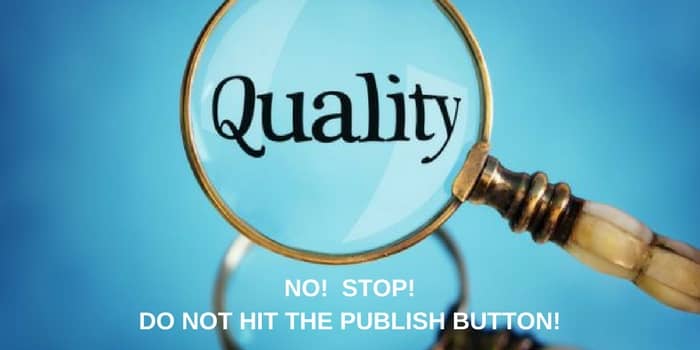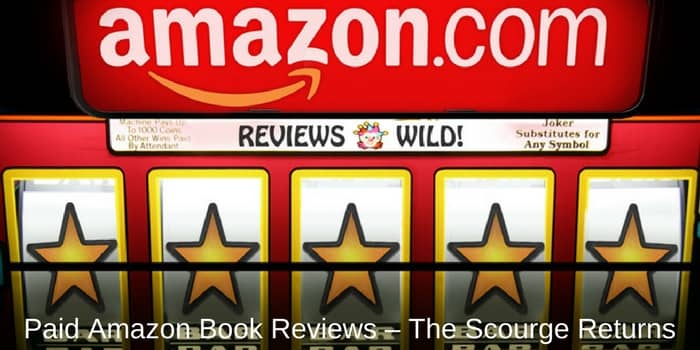
After weeks, months or years, you have finally finished the last draft of your book.
No doubt you have spent hours upon hours checking grammar, spelling, punctuation, plot errors as well as fixing formatting and style problems. You have probably read your final draft so many times by now that you are sick to death of it, but finally, you know it’s perfect and you’re ready to publish your new book.
NO! STOP!
DO NOT HIT THE PUBLISH BUTTON!
No matter what your level of expertise in writing, or your depth of acumen in English grammar and lexis, there is just no way on this planet that your manuscript is ready for publication yet. You wrote it; therefore, you love it. Therefore, you do not have the independent eye that is now necessary to find the problems that still lie within your writing.
After publishing nearly a dozen books, I can speak from hard learned experience that errors within a published book not only reduce its readability, but also have a detrimental effect on your reputation as an author, and of course on book sales. Apart from my writing, I am an English teacher so it would be reasonable to assume I have a good grasp of the English language and can do a decent job of editing and proofreading. Well yes, but not of my writing. There is something weird about the human brain that stubbornly refuses to accept its own mistakes.
I would never think of publishing anything longer than a blog post without an independent assessment of my writing. Whether it be an editor, a proofreader or a number of beta readers, the need for independent assessment is vital. In my case, I use all three when it comes time to publish a new book.
It is common knowledge that self-publishing has allowed every man, woman, and his or her dog to publish a book nowadays and that the poor quality of a lot of what is ‘Indie’ published is casting a shadow over self-publishing. However, readers who scan Amazon and other ebook and book retailers for books to buy and read don’t necessarily divide their choices between big publishers and Indie publishers. They make their choice based on the old fashioned standard of quality. If there are clanging errors in the first 3,000 words that are available as a preview read for your book, you’re dead meat so to say. So don’t rush to publish. Slow down and take your time and get those independent eyes working on your manuscript.
Then while you’re waiting for your new manuscript to be edited, proofread and beta read, why not spend your time productively? What about a great cover and a killer book description and blurb that will help sell your book as well as updating your author bio? Start making contact with book bloggers and reviewers and advise them of your upcoming book. What about an author interview or three?
Then, even with the most meticulous editing and proofreading, errors can still slip through. Luckily, though, the technology of publishing now allows for a quick republish when these are spotted, so one could say that the process of perfecting a manuscript can be an ongoing process. In my case, I have updated my books on numerous occasions as I have noticed small errors or typos that have slipped through.
So never sacrifice speed for quality. Publishing quality books that are readable and thus enjoyable for readers takes and patience. Don’t rush to the publish button and ruin your reputation.



All the above is true. My article on the same theme “Are You a Literary Dunce”, was published today on Angie’s DIARY Derek. If you want to read it, take a look at: http://angiesdiary.com/articles/are-you-a-literary-dunce/
Hi Derek, what you are saying makes sense, but sometimes you are friendless, betareaderless, dollarless, and isolated, and you have to go it on your own, as in my case. My books are written by me, edited by me, proofread by me, and the covers are designed by me. All of this not by choice, but necessity.
So far I have received praise, and compliments (check out my blog) but never a single complaint, not even from those reviewers who target books that are free. From this I think I can assume readers are satisfied with the quality and editing of my trilogy. Though the first book is free, I’ve pushed my prices for the second and third books to $3.99 and readers still seem happy to pay it. Maybe I just got lucky?
Well Niki, all I can say is that you have a beta reader looking you in the face! :)) lol But it is also true that the harder you work yourself, and are prepared to spend the time perfecting a manuscript, the better the finished product will be. I think my post’s point was about avoiding the rush to publish. Clearly way too many fall into this trap and pay for it.
This makes a lot of sense. I recently stopped reading a book a bought on my kindle precisely for those reasons. There were just too many howlers that showed total disregard for spellings, grammar and punctuation, which totally spoiled my enjoyment and I couldn’t be bothered to carry on reading. I must add that this is not a habit of mine, as I usually finish all the books I start.
Exactly Pasmonauta! I think you’ve summed up what my post was all about. Thank you. :)
Derek, thank you for this post. I do experience the same thing both at work and when I am writting. I have had to give out my manuscript to my wife and friends lately and the quantity of correction is surprising. I do appreciate your blog posts, they are very interesting and encouraging. @TomideTogun.
You know, I don’t mind a few typos, but what really gets to me are those who, with passion and confidence, use dialogue attributes incorrectly.
I had people on a writers’ website correct my hers to her’s. And those who told me that ‘What?’ she asked, needs an upper case ‘S’.
And those who put, ‘Should I do it (in italics),’ she whispered. Then I know I’m dealing with a beginner and will stop reading immediately.
If those books don’t go through some professional hands, it’s a disaster.
Oh damn Stella, I’m going to have horrid orthographic nightmares now! :))
Glad to hear that I’m not the only one who can’t catch his own mistakes! I do have an editor but I’m thinking of suggesting a beta-ring over at goodreads. There are a few good writer’s groups that don’t mind talking to each other about writing process.
On another note – I finally broke down and ordered a kindle touch. First book to be read will be Hal! I got halfway through on my smartphone but the darn screen is too small.
Glad to hear you’re going the tablet reader brigade Andrew! But on the topic of beta readers, I have four very trusted beta readers who I owe a lot, and more. You don’t need many, but you do need to trust their judgement and listen to their feedback, which is golden.
It’s about time. I had the kobo touch but, lately, I’ve been loading titles only on Amazon. I find the titles are cheaper there than at Indigo as well.
I had started reading Hal about two or three months ago but on the smart phone kindle app. That get’s hard on the eyes (the small screen – not the story!), I figured it was time to get a reader that will let me check out my own work in it’s natural habitat.
I am definitely going to round up some SciFi writers on Goodreads to share some Beta work. Glad I dropped by the Vandal today!
Excellent advice, as always.
It’s a tough environment, this indie publishing lark. Like Pasmonauta, I rarely used to fail to read a book through. But receiving a kindle for Christmas and downloading a load of indie books has destroyed my ‘started so I’ll finish’ ethos.
There are always beta readers out there, as long as you have an internet connection, so no excuse for more than the very occasional typo. Indie writers need to make the move from vanity to pride!
Hi Derek.. Thanks for the help you have provided here in terms of publishing anything.. I just hope it can help others as well..
After weeks, months or years, you have finally finished the last draft of your book. No doubt you have spent hours upon hours checking grammar, spelling, punctuation, plot errors as well as fixing formatting and style problems. You have probably read your final draft so many times by now that you are sick to death of it, but finally, you know it’s perfect and you’re ready to publish your new book.
“It figures”, came to mind when this popped up on my twitter account. After countless refinishing touches, proofs, and finally seeing my book where I would like to; I hit the publish button. Feeling giddy, I went to sleep with thoughts of how my book was going to be out there. Out of nowhere, something hit me like a ton of bricks. My head sunk low, and I thought “oh sh*&t”. There is nothing worse than publishing a book and realizing later, you may have made a grammatical error or two. Of course, for me, this is the worst feeling in the world, considering this is a book for special need children. I may have just confused many people, including myself over the word lay vs lie. One of the most elementary grammar rules I believe I forgot. Since this is my first published book; I pray no grammar police recognize this error! Long story short, you are so correct….don’t hit the publish button until you are 110% sure it’s not a flop in certain aspects!! On the flip side, we live and learn …I will choke mine up to learning so much new information, being my own “everything” (which is like several jobs at once..publisher..editor..partial illustrator..web designer..book designer..marketer..etc); I totally forgot my 3rd grade English lesson! ;p